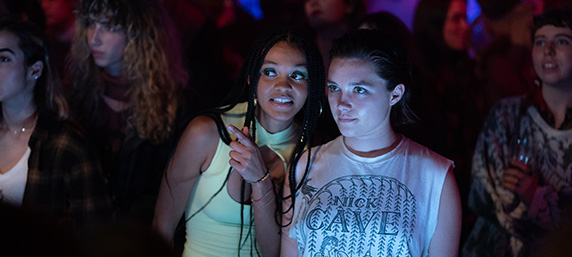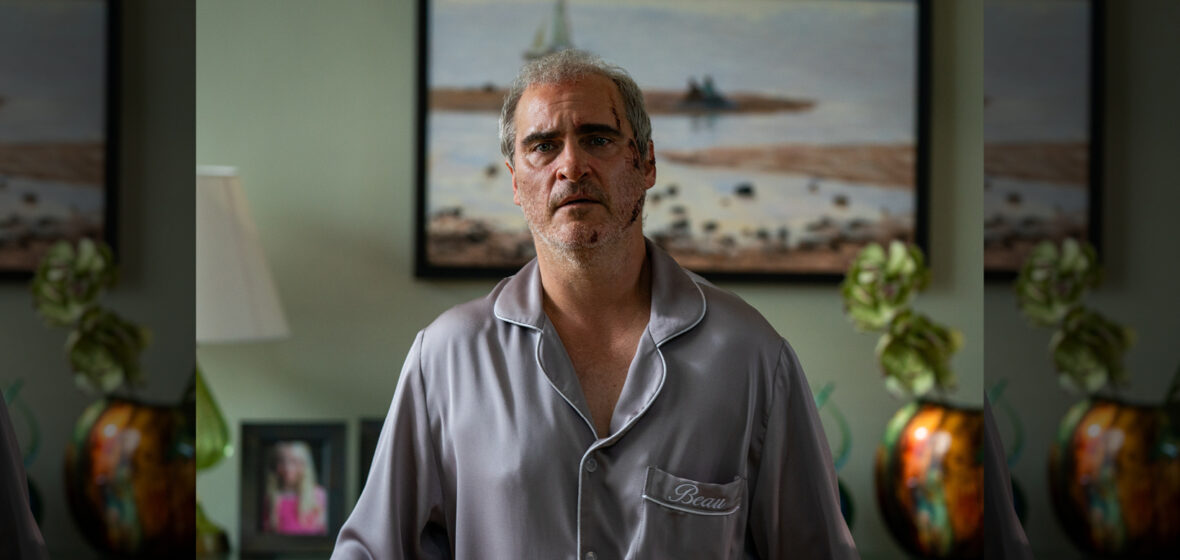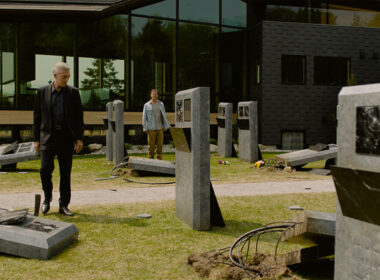Beau is Afraid
Great films are personal. It’s a relatively modern, and preposterous, idea that a filmmaker owes anything to the audience. The people who say this mean that the “audience” is a composite, uniform monster with a single conscience that demands the same stimuli at precisely the same time. Filmmakers who go out of their way to please the beast are set to fail. Filmmakers who don’t even consider or address the monster’s existence make great films.
Beau is Afraid is a great film.
Right off the bat, it’s essential to warn the unaware cinemagoer: this film is not for everybody. It’s a three-hour-long allegorical absurdist tale about childhood trauma, mother issues, systemic poverty, generational wealth, solitude and celibacy. It is, above all, profoundly personal to writer-director Ari Aster’s own experience, which means he offers the audience the most exciting proposition: come and visit the deep subworld of an artist’s fears and anxieties. Anyone who rejects this offer misses an expanding universe of emotions and ideas.
The idea is relatively simple. Because of a freak situation, Beau (Joaquin Phoenix) misses the flight to visit his controlling and narcissistic mother (Patty LuPone). In the aftermath, he finds out she has passed away and left just one wish — that her funeral only go ahead when her son is present. So Beau, the dedicated son, embarks on a journey back home, meeting a series of colourful characters, each representing a different type of dysfunctional psyche. It’s Scorsese’s After Hours, which is to say it’s Homer’s Odyssey, via Charlie Kaufman’s Synecdoche, New York.
The film’s first section is an anxiety-inducing tour de force from hell. Before finding out about his mother, Beau has to navigate the strange status quo of his neighbourhood — his apartment block is surrounded by scary-looking homeless people who try to find ways to get inside. In his home, he’s bullied by a neighbour who claims Beau is playing music too loudly. At the same time, the whole city is being terrorised by a crazy naked serial killer.
But behind the chaos’s cacophony, Aster is blatantly analysing feelings of loneliness and paranoia, hypochondria and detachment. Everything in the film is blunt. Of course it is: good surrealism doesn’t hide the fact that everything bears a meaning (regardless of what Dali and Buñuel tell you).
In the second section of the film, Beau finds refuge with a gentle couple, played by Nathan Lane and Amy Ryan. They treat Beau in a way that suggests they are trying to replace the gap left by their dead son, to the dismay of their rebellious daughter. In a later part of the film Beau finds himself in a commune of actors rehearsing a play that he projects onto his own experience.
Aster is happy to scrutinise another pathology through the vehicle of Beau as a representation of the filmmaker’s own profound and guttural emotions. I couldn’t even tell about the attic scene (a secret in the attic, subtle) without spoiling one of the bravest and most deranged moments you will see all year — but trust me, even if you hate the moment, you won’t be indifferent to it.
If there is one problem with the film it is that the more it progresses, the more it loses a bit of its humanity. And maybe that’s a good thing, but I remember that Synecdoche, New York ended in this beautiful life-affirming moment elevated beyond the psychoanalytical nature of its plot. Beau doesn’t have that. I enjoyed the ending, but it’s also a cynical moment that only highlights the one thing the film is missing — a heart.
I get it, though. Beau is a cynical film: it must feel cathartic for Aster to face head on some of the mental issues he had hinted at in his previous films (mother issues in Hereditary, social disconnect and trauma in Midsommar), so it makes sense that he approaches it in this “oh I know it’s ridiculous” kind of way. The reason it works is that Beau is also hilarious. Every set-up is shot like a genuine drama. Still, something in the background or the characters’ movements adds a feeling of uncanny uneasiness, like a Jacques Tati film shot by Jodorowsky.
This makes the film incredibly entertaining — for three hours I laughed, screamed, and got angry at Aster for making me confront my anxiety issues, but eventually I cackled again. Many reactions to the film characterise it as dull, but I don’t see it — Beau worked for me.
Maybe that means I have to deal with some unresolved problems. Perhaps I should go back to therapy.
Verdict: 5 out of 5
For cinephiles who are eager for something new that invites scrutiny and analysis, even if they don’t love it. But especially for those with a sense of humour.

A good person
In the early 2000s, we all thought Zach Braff was a good idea. He was the star of Scrubs, a funny show where men had the liberty of addressing their feelings. It felt refreshing after the super macho time of the 80s and the everyman disquiet of the 90s. Doctor John “JD” Dorian was happily living in a constant state of arrested development. He cried and made mistakes. He didn’t like sports, but took long baths and listened to sad indie music. Braff himself encapsulated this when he finally wrote and directed his first feature, Garden State: it was as if he were projecting all the tragic young adult ennui post-9/11.
Have you watched it? Yeah, it was a product of its time.
Watching Braff’s new feature, A Good Person, I realised that though the world has moved on, he hasn’t as an artist. Granted, the themes of his films are more adult. However, he still approaches them with the same patronising inexperience of a twenty-something-year-old. Which would be endearing if Braff wasn’t a 48-year-old man.
The story revolves around Allison (Florence Pugh), who’s engaged to be married to Nathan (Chinaza Uche) when the car she’s driving is involved in an accident, and Nathan’s sister and brother-in-law die. One year later, Allison is living with her mother (Molly Shannon), having broken up with Nathan, and having developed a severe addiction to painkillers. Trying to fix her addiction, she attends an AA meeting, where she is confronted by Daniel (Morgan Freeman), Nathan’s father, who has been looking after his granddaughter Ryan (Celeste O’Connor) since the death of her parents. Nathan sees this as a chance for redemption and healing, and befriends the broken Allison.
So yeah, heavy themes indeed, but to what gain? American independent cinema has the bad habit of revelling in the misery of its characters and calling it social commentary. But it can’t hide the fact that behind the camera is a privileged rich man who has never had to deal with the experiences he is depicting — and, while I don’t think an artist needs to have suffered to represent his art, he has to at least understand and carefully observe the trauma he’s exploring. Braff brings the attitude of a cheesy soap opera while trying to play it like it’s a Tracy Letts play.
So nothing here feels genuine. Grief emerges like a shadow hanging over the characters that would disappear if only they talked about it. For me there is nothing authentic about this. Despair is self-destructive and continuous. It takes years, decades, to approach. It needs denial, violence, being rock bottom — and I mean the pit of an emotional void, not just the experience of a moment, where our protagonist takes an underaged girl to a party, does drugs, and a rich white boy with a face tattoo tries to sleep with the girl. That’s not rock bottom. It’s only a single episode.
This makes me reflect how expertly Nanni Moretti dealt with loss and the struggle to move on in his masterpiece, The Son’s Room. He did so by being truthful to his film’s characters and not to an eagerness to make the audience cry. From that truthfulness comes a truth so strong it delivers real strong emotions. A Good Person has none of that.
The actors do the best they can with what they’re given. Pugh and Freeman are good at it, but they are good actors anyway. I suspect they changed their own lines in the script, because the supporting cast is left with some lines that are real doozies. As good as Pugh is, I doubt she could say something as trite as “Marx was wrong, the opium of the masses is … opium” with a straight face.
After the success of Garden State, Braff famously started a crowdfunding page to finance his next project, even though he was a household name and could quickly secure funding from investors. His reasoning was that producers were trying to change his script, and he felt his artistic vision was being compromised. Far be it from me to impose my views on an artist, but maybe he should listen to some criticism. I wouldn’t have to be put through this endeavour again.
Verdict: 1 out of 5
For those who cry easily and Florence Pugh completionists.




